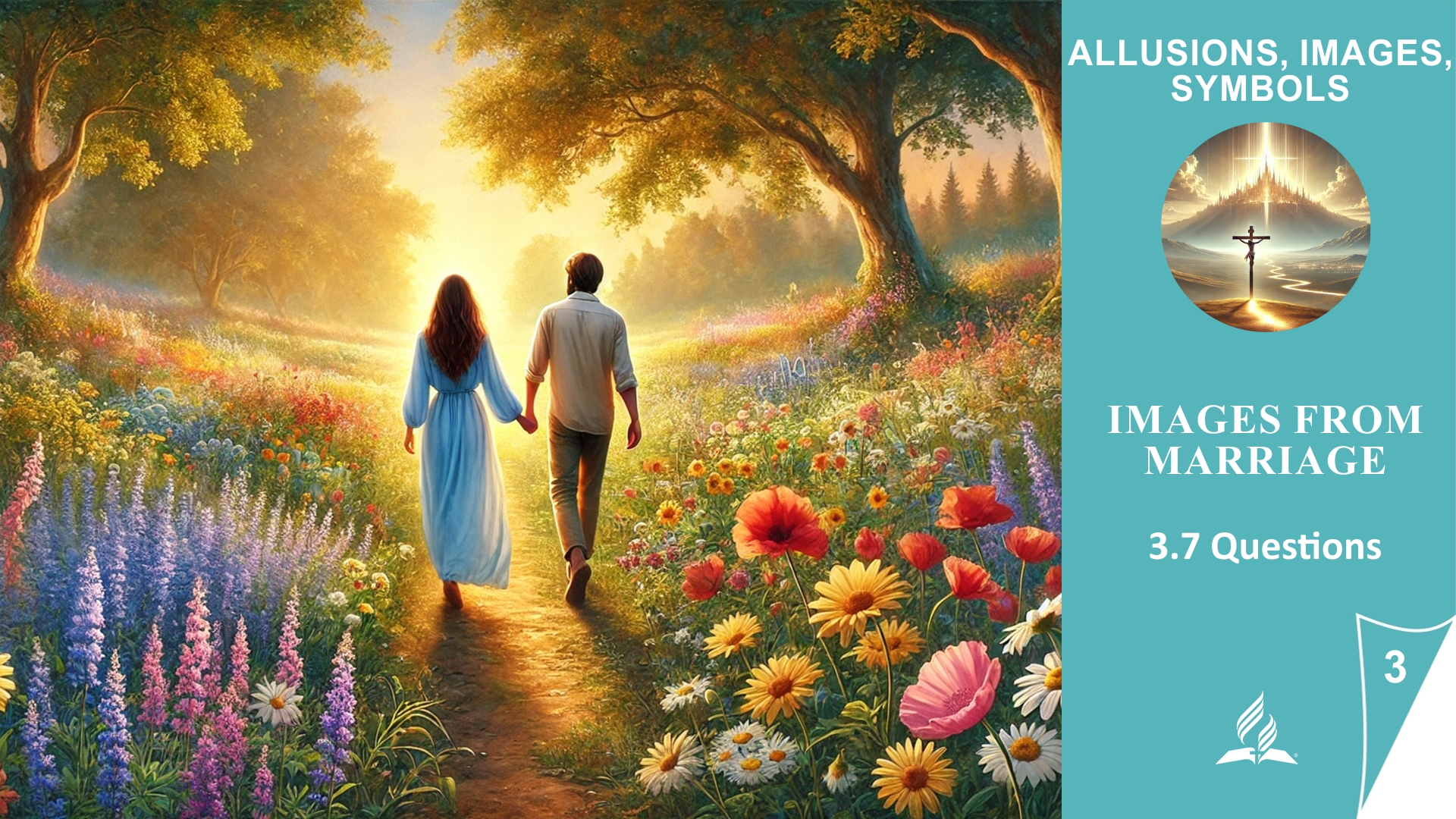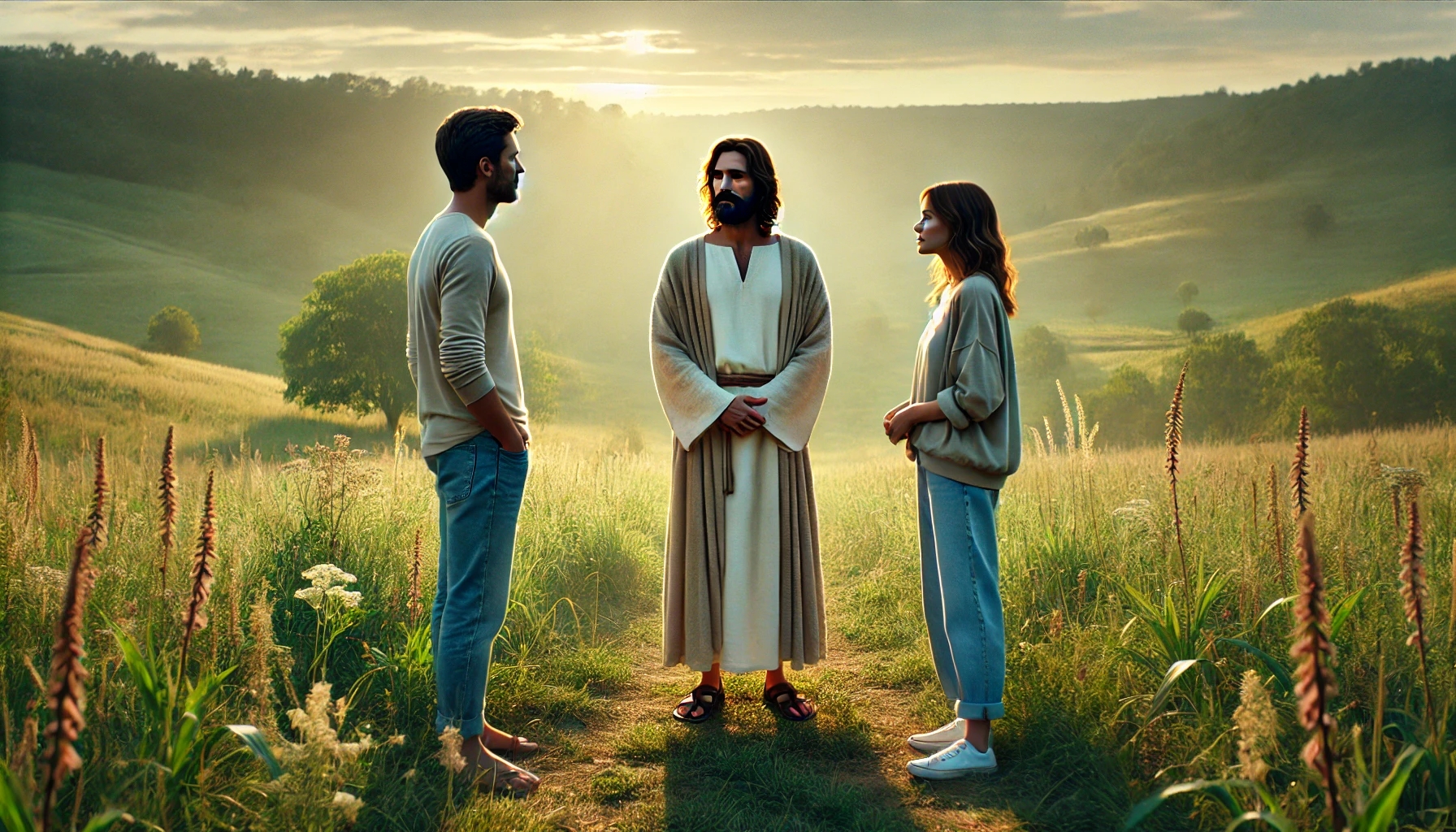Lesson 3.Images From Marriage | 3.7 Questions | ALLUSIONS, IMAGES, SYMBOLS | LIVING FAITH



📘 Lesson 3 – Images From Marriage
3.7 Questions
The final wedding feast and the watchful Bride
🟦 Introduction – The Bride Still Waits
The Bible begins with a wedding in Eden—and ends with a wedding in Revelation. In between unfolds a love drama between a divine Bridegroom and His often unfaithful, yet deeply beloved Bride. The wedding symbolizes closeness, covenant, trust—and the great goal of redemption. But before the feast comes the test: patience, faithfulness, and spiritual discernment are required so as not to miss the feast of all feasts.
📖 Bible Study – Three Questions for the Bride’s Heart
🔹 Question 1: Read John 2:1–11. The Gospel of John contains many signs that point ahead to Christ’s work. Commentators have noted how deliberately John leads his readers toward the cross. Where do you see in this episode various aspects of Christ’s nature and His coming kingdom? What does it teach us about God’s redemption plan or about the ultimate wedding feast promised by the Son of God?
Answer outline:
-
At Cana Jesus not only displays power but unveils deep symbolism. Turning water into wine speaks of the shift from the Old to the New Covenant. The “best wine” arriving last mirrors how God’s glory will be fully revealed at the end.
-
Aspects of Christ’s nature:
-
He is a God of abundance (six stone jars holding roughly 500 liters!).
-
He is not a distant observer but an involved Savior.
-
His glory shines brightest in our need—the feast was nearly over, the wine gone, and then the miracle occurred.
-
-
About the Lamb’s wedding feast:
-
It will be a real event, overflowing with joy and divine presence.
-
It will happen when everything is ready—and the grandest moment will be the last, when Jesus returns.
-
🔹 Question 2: The Parable of the Ten Virgins is well known and beloved. What does this story teach us about end-time events? Does the groom’s delay matter? What might it teach us about our individual relationship with Christ, as opposed to how Christ relates to the church as a whole?
Answer outline:
-
Five wise, five foolish: all fall asleep, but only the wise have enough oil—a symbol of the Holy Spirit.
-
Lessons:
-
Delay is a test. Many give up when Jesus doesn’t come as soon as they expect. But waiting is part of the preparation.
-
The difference isn’t knowledge but character. All knew the groom would come—but only the wise lived in constant readiness.
-
-
Individual vs. corporate:
-
Oil cannot be borrowed. In crisis we see whether faith is personally rooted or merely inherited.
-
The church can prepare collectively—but only each person can remain watchful.
-
🔹 Question 3: Consider false practices that have entered Christianity from outside. Aside from the obvious (Sunday instead of the biblical Sabbath), what other erroneous beliefs have crept in? How did they enter the church, and what can we do not only to guard ourselves against them but also to help others recognize them for what they are? In what way is the Three Angels’ Message an attempt to do exactly that: to help people identify false beliefs that have infiltrated the faith?
Answer outline:
-
Beyond Sunday-for-Sabbath we see:
-
Immortality of the soul, contradicting Scripture’s teaching on resurrection.
-
Assurance of salvation without obedience, a “cheap grace” that makes Jesus Savior but not Lord.
-
Prosperity gospel, turning the cross into a credit card.
-
-
How they entered: through human philosophy, tradition, and world-conformity.
-
What to do:
-
Know and love the Bible.
-
Live and share the Three Angels’ Message: worship the Creator, warn against Babylon, proclaim righteousness by faith in Christ.
-
✨ Spiritual Principles
-
Truth is precious—and requires watchfulness.
-
Spiritual readiness is not an event but a lifestyle.
-
The Bride of Christ is beautiful because Jesus has cleansed her—not by her own merit.
🧭 Practical Application
-
Fill your oil jar daily—with prayer, Scripture, and obedience.
-
Wait not only for Jesus but wait with hope and action.
-
Help others discern truth from religious tradition—with love, not superiority.
✅ Conclusion – The Feast Is Coming
The wedding is certain—but entry is personal. Only those prepared will attend. The invitation stands. Yet the door will one day close.
💬 Thought of the Day
The question isn’t just whether Jesus is coming—but: Am I ready to receive Him—as Bridegroom, not merely as Judge?
✍️ Illustration – The Final Invitation
Heidelberg, late autumn.
The cobblestones gleamed from the rain. In a small antiquarian bookstore in the Old Town worked Emilia, 32, unassuming in appearance but inwardly a seeker. Her days were quiet: books, tea, discussions of Dostoevsky—rarely of God.
But for weeks something had been stirring. An elderly customer, Professor Rahm, had engaged her in conversation. “Did you know,” he said, “there’s a parable in the Bible… ten virgins… only five had enough oil.”
Emilia had smiled. “I’m not religious. More culturally curious.”
“All the better,” he replied. “Then your lamp may still be empty—but not yet closed.”
Since then she’d quietly read Scripture at home—especially John. John 2 touched her: Jesus at a wedding doesn’t preach but saves the wine. He doesn’t come with thunder but with grace. He doesn’t moralize but invites.
Then came Matthew 25. Ten virgins. The groom delays. Five doors stay shut.
“Am I one of the foolish?” she wondered constantly.
A few days later: She stood at her attic window wrapped in a wool scarf. Mist drifted through the lanes. The bells of the Holy Spirit Church struck seven.
Her phone buzzed. An invitation:
“Revelation Seminar – The Marriage Feast of the Lamb: Reality or Metaphor? Today, 7 PM, Neuenheim Community Center. Free admission.”
She almost deleted it. But hesitated—and clicked “Attend.”
The hall was warm. Simple wooden benches. No organ, no incense. Just a man up front with an open Bible.
“The last book of the Bible,” he said, “doesn’t end with judgment. It ends with a wedding.”
Then he read Revelation 19: the Bride, the Lamb, the jubilation—and Revelation 21: “Behold, God’s dwelling is with mankind… He will wipe away every tear…”
Tears sprang to her eyes. Not because she understood, but because she felt something—not religion, not dogma, but a summons.
At evening’s end she lingered by a corner. An older woman approached.
“You’re here for the first time, aren’t you?”
Emilia nodded. The woman smiled. “I’m Ruth. Would you come back next week? We have a small group. We’re preparing—like the wise virgins.”
“Preparing for what?”
“For the wedding,” Ruth said. “Yes, the groom is delayed. But He’s coming—and He wants you there.”
Emilia went along. In that moment it felt as if she walked through an open door. The banquet hall was still empty. But she knew: the table was set— for her.
📖 “For many are called, but few are chosen.” (Matthew 22:14)




















